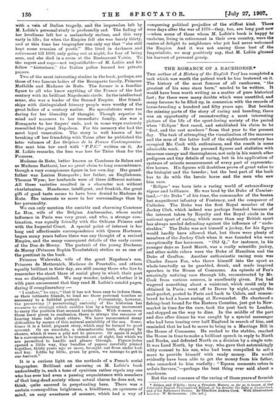WOMEN OF THE SECOND EMPIRE.*
"HISTORY in its more frivolous aspect !" This, according to If. Loliee, is the idea of his book. It is a picture, or a series of pictures, of the more conspicuous figures of the Court of Napoleon III. It is a volume of glorified gossip, and though its heroines, in some cases, had a certain influence on ephemeral politics, they were mostly, we may say, mere foam on the surface of history. The highest value of such a study of the Imperial society is not for contemporaries, and it cannot be complete while some of the most distinguished members of that society are still living. It is rather for future genera- tions and future centuries, a means of reconstructing the social life of a period from those stories of more or less local gossip which make a background to history. As to great events, the world rolls on its way ; and an occasional push from the hands of some clever or beautiful woman makes little difference to its main course. With all respect to Mr. Whiteing, whose thoughtful introduction adorns the book with more dignity than it seems to us rightly to possess, one can hardly place Joan of Arc on the same level as Madame de Pompadour or several of the ladies whose lovely faces enchant us in these pages ; she stands apart, an exception to every rule. While touching on this . subject • of political influence, we may add that it is not fair, when the whole matter is dispassionately considered, to lay the entire responsibility of the Franco-German War on the Empress Eugenie. Mr. Whiteing's remarks here are interesting and very just. The war was inevitable. Germany had been long prepared for it, and if the Empress's absolute confidence in victory was too rash, if she believed France to be ready when it was not, she shared these mistakes with the majority of French generals and statesmen. If France had been victorious, it is probable that • the Prince Imperial would now be reigning there, his mother one of the stateliest figures among the Royalties of Europe. The game would have proved itself worth the candle.
In this book, however, the Empress is only a central star round which revolve brilliances little less dazzling. There is no new gossip, we are thankful to say, to be raked up against her. The chronicler's regret is evident, and he longs for the time, fortunately not yet arrived, when Imperial secrets will no longer "be locked away from prying eyes "—the expression is his own, for he is frank and cynical—but when all the inner history of Napoleon M.'s reign will be laid open to the gaze of those who are pleased to call themselves "historians." We are inclined to doubt whether the result will give much fresh food to lovers of scandal. The story of the Empire has its good and its bad side; the latter has been scraped out with sufficient thoroughness, as this book, among others, bears witness. We are more likely to learn the explanation of all that personal loyal devotion, those faithful friendships in quarters absolutely above suspicion as to private morals or political ambitions, of which the Emperor died possessed, and which will never desert the Empress.
Among the most famous ladies of a brilliant, daring time, whose romantic stories are here told in considerable detail, Madame de'Castiglione holds a foremost place. A good deal of nonsense is talked about beauty ; in truth, that supreme gift is possessed by very few. To judge by the positive voice of fame and by the portraits here given, Madame de Castiglione was among those few. In figure and in face the lovely Florentine was beyond rivalry. But—if proof of such a truism were needed—the story of her life puts it beyond question that beauty is not always the gift of the best of fairy godmothers. She was absolutely and quite strangely wrapped up in her own external perfections. This "mystic cult for the beautiful as represented in her own person" was far more to.her than the influence gained by her beauty over Napoleon III. She was an eccentric and unhappy woman • Women of the Second Empire Chronicles of the Court of Napoleon III. Compiled from Unpublished Documents by Frederic Late. Translated by Alice II. Ivimy. With an Introduction by Richard Whiteing. and 51 Portraits. 3 in Photogravure. London John Lane. [21s. net.] -with .a NOill of Italian tragedy, and the impression left by M. Loliee's personal study is profoundly sad. The fading of her loveliness left her a melancholy recluse, and this very early in life; for when the Empire fell she was barely thirty, and at this time her biographer can only say that "she still kept some remains of youth." She lived in darkness and
retirement till 1899, only going out at night, for fear of being seen, and she died in a room at the Restaurant Voisin. To the regret and rage—not unjustifiable—of M. Loliee and his fellow "historians," the Italian police burned her private papers.
Two of the most interesting studies in the book, perhaps, are those of two famous ladies of the Bonaparte family, Princess Mathilde and Madame de Ruth. The former is a familiar figure to all who know anything of the France of the last century with its brilliant Napoleonic circle. In the intellectual sense, she was a leader of the Second Empire. Her friend- ships with distinguished literary people were worthy of the great ladies of a century earlier. No speculations were too daring for her liberality of thought. Though superior in mind and manners to her immediate family, she was a Bonaparte to her fingers' ends, and in some ways curiously tesembled the great Napoleon. For his memory she had the most loyal veneration. The story is well known of her breaking off her friendship with Taine after he published the later volumes of Les Origines de in Prance Contemporaine. She sent him her card with " P.P.C." written on it. As
N. Loliee remarks, the loss was less for Taiue than for the Princess.
Madame de Rule, better known as Comtesse de Solms and as Madame Rattazzi, has no great claim to long remembrance, though a very conspicuous figure in her own day. Her grand- father was Lucien Bonaparte ; her father, an Englishman, Thomas Wyse; her husbands were of three different nations. All these varieties resulted in a character not without Charlatanism. Handsome, intelligent, and freakish, the great gift of good taste seems to have been denied to Madame de Ruth. She interests us more in her surroundings than by her personality.
We can only mention the amiable and charming Comtesse Le Hon, wife of the Belgian Ambassador, whose social Influence in Paris was very great, and who, a strange com- bination, was equally friendly with the Orleans Princes and with the Imperial Court. A special point of interest is her long and affectionate correspondence with Queen Hortense, begun many years before there was any thought of a revived Empire, and the many consequent details of the early career of the Duo de Morny. The portrait of the young Duchesse de Moray (Princess Sophie Troubetskoi) strikes us as one of the prettiest in the book.
Princess Walewska, wife of the great Napoleon's son, Princess de Metternich, Madame de Pourtales, and others equally brilliant in their day, are still among those who live to reniember the short blaze of social glory in which their part was so distinguished. We may wonder, indeed, whether it is with pure amusement that they read M. Loliee's candid pages, daring if complimentary :—
"I confess," he says, "that it has not been easy to induce them, or their intimate friends, to lend me those personal touches so necessary to a faithful portrait Fortunately, however, the preserving [? persevering] curiosity of the historian has recourse to strategy which enables him by a turning movement to carry the position that seemed invincible. With women, even those least given to confession, there is always the resource of hearing them talk about others. We have surmounted many difficulties by means of this natural amiability of the sex. Some- times it is a brief, piquant story, which may be turned to good ticcount. Or an anecdote, a characteristic trait, dropped by Silence, which it were a pity not to preserve. Or again it might be a correspondence, not to be trusted out of sight, but which we are permitted to handle and glance through. Pigeon-holes opened a little way, tiny bundles of papers carefully pinned together, thirty years ago or more, brought out from under lock and key. Little by little, grain by grain, we manage to get in our harvest."
It is a curious light on the methods of a French social biographer. Brilliant and amusing as N. Loliee's book undoubtedly is, such a tone of cynicism rather repels any one who has ever had even a passing acquaintance with members of that long-dead society whose actual charm he does not, we think, quite succeed in perpetuating here. There was a certain cosmopolitan brightness, a kindliness, an openness of mina,
an easy sweetness of manner, which had a way of
conquering political prejudice of the stiffest kind. Thera were days after the war of 1870—they, too, are long past now —when some of those whom M. Loliee's book is happy to enshrine, living in retirement in their own country, were the centre of delight to neighbours who yet had never welcomed the Empire. And it was not among these best of the Imperialists, we may positively say, that M. Loliee gleaned his harvest of personal gossip.







































 Previous page
Previous page